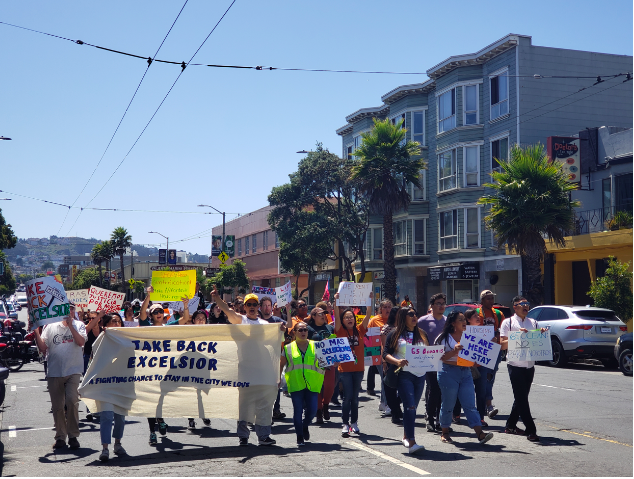
On Sunday afternoon, Excelsior residents and community-based organizations gathered to march, drum, chant, perform, and express their collective anger and distress over the rise of luxury development that has started to seize the largely immigrant and working-class neighborhood of the Excelsior.
The development site in question is at 65 Ocean Avenue, which was formerly home to Crayon Box Preschool and Little Bear Preschool. The site is located down the block from Balboa Park and is spearheaded by Presidio Bay Ventures, a real estate investment and development firm. Of the 193 units included in this development, 75 percent will be priced at market rate and 25 percent will be offered below market.

Led by Communities United For Health and Justice —an alliance of Excelsior-based and District 11-based organizations, including the Filipino Community Center, Coleman Advocates for Children and Youth, PODER SF, Bernal Heights Neighborhood Center, and Chinese for Affirmative Action— the action kicked off at the ChesHill luxury condominium building complex at 5050 Mission Street, where the listed rental price of a one-bedroom, one-bathroom, 759 square foot apartment starts at $3,225.
“We started at 5050 Mission Street because it’s the largest already-constructed housing development in the Excelsior,” said CUHJ program manager Jessie Fernandez. “[This building] is already setting a precedent for the price of market rate units in this neighborhood, which are out of touch and out of reach for neighborhood residents,” he added. The march started at the ChesHill complex and continued down Mission Street before concluding at the proposed development site at 65 Ocean Avenue.
According to Fernandez, for months after the ChesHill apartment complex was completed, many of those units were vacant. “It’s a real injustice to so many folks who are feeling the pressures of the housing crisis. This model around leveraging affordable units by creating market rate housing units is a false solution and we saw that as an example at 5050 Mission Street. We don’t want to repeat that mistake,” Fernandez said.
Though the 65 Ocean Avenue proposed development will use HOME-SF, San Francisco’s local density bonus program, residents and community advocates believe that meeting the inclusionary requirement at 25 percent doesn’t go far enough, nor does it address the needs of the community.
According to Fernandez, 70 percent of the units at 65 Ocean Avenue will consist of studios and one-bedroom apartments. Opponents say the development is not family friendly, especially in a neighborhood that has the highest rates of seniors, families, and intergenerational homes in the city. In fact, according to the most recent American Community Survey (ACS) Socio-Economic Profiles by Supervisor District report from 2012-2016, 76 percent of households in District 11 consist of families. Further, District 11 is home to multiple schools, including elementary, middle, and high schools— leaving neighborhood residents wondering whether this project truly is meant for those who live there.
“We are asking for 100 percent affordable housing,” Fernandez said. “We need affordable housing for our janitors, dishwashers, teachers, nonprofit workers, and all who could benefit from more affordable housing.”
Sunshine Roque, an immigrant, longtime Excelsior resident, and local educator, believes that the Excelsior not only remains one of the last working-class strongholds in San Francisco but also one of the main points of entry for immigrants due to its affordability and multicultural roots. “People in the Excelsior are embedded in this fight— it’s not something we have signed up for, or a meeting we went to… we just want to live and stay here,” she said.
CUHJ and community members are not anti-housing by any means— they recognize the need for housing, especially considering the high levels of displacement and homelessness that are very real and very present in San Francisco and the Bay Area. However, they want to make clear that we are in the midst of an affordable housing crisis and any development that takes place in the Excelsior should take into account the voices of those who live there.
“We are responding to the failed solution that the city and the developers have been feeding the Excelsior and San Francisco citywide: that the only way we can adjust questions of affordability is to build more,” said Charlie Sciammas, a lead organizer for PODER. “We need to think about who we’re building for and how affordable that housing is. We envision developments that are created by the community and include the voices of youth, families, immigrants, seniors, and working-class residents,” Sciammas said.
This is not the first time that CUHJ has been engaged in a fight for more affordable housing. Last year, CUHJ and community advocates opposed the 253 market rate unit development at the Safeway-Valente site in the Excelsior, but fortunately for those who opposed, the plan was scrapped last fall after the deal between Safeway and the developer fell through.
Additionally, the community’s demands for more affordable housing beyond what is required by state or local density bonus programs is not unheard of. A development project located practically right next door to the proposed development at 915 Cayuga Street is double the affordability requirement and double what 65 Ocean Avenue is offering at 58 affordable housing units out of a total of 116 units. 915 Cayuga was unanimously approved by the Planning Commission in April.


